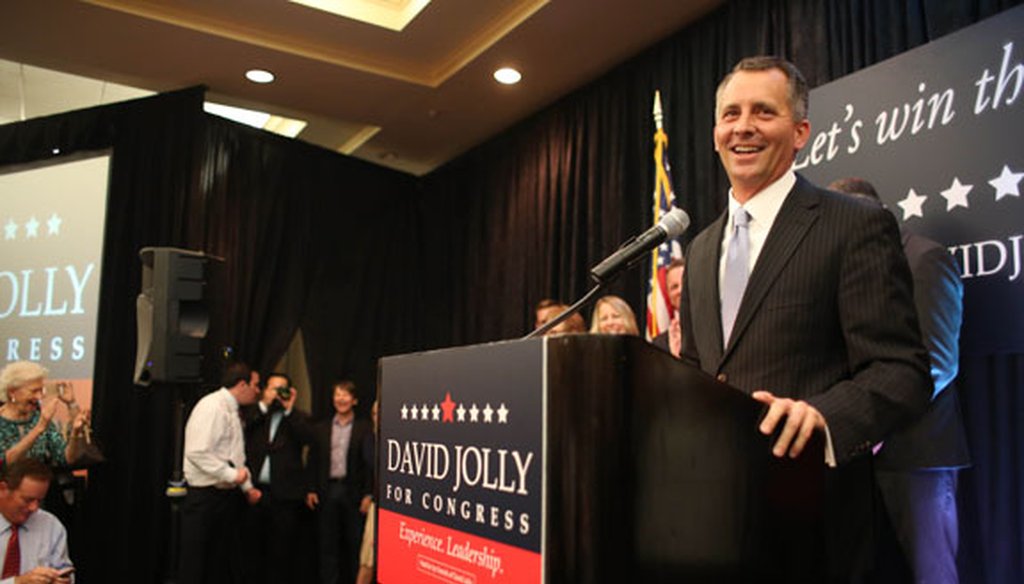Stand up for the facts!
Our only agenda is to publish the truth so you can be an informed participant in democracy.
We need your help.
I would like to contribute

U.S. Rep. David Jolly celebrates winning a special election for Congress at the Sheraton Sand Key Resort in Clearwater Beach on March 11, 2014. (Tampa Bay Times photo)
With only 15 months of congressional experience under his belt, U.S. Rep. David Jolly is announcing that he’s running for the Senate seat being vacated by Republican presidential candidate Marco Rubio.
The 42-year-old Dunedin native announced July 20, 2015, he was seeking the Republican nomination after winning a March 2014 special election in Pinellas County’s 13th congressional district. The district has been one of the few genuinely competitive districts in the country, but the state Supreme Court ruled that it’s one of several that will have to be redrawn to conform to fair-districts rules passed by ballot measure. Those changes are expected to make the seat significantly more Democratic-leaning by adding heavily Democratic-leaning St. Petersburg in southern Pinellas to the district.
A lawyer and former lobbyist, Jolly was an aide to the district’s longtime congressman, U.S. Rep. C.W. "Bill" Young, who died in office in 2013. After winning the tight special election, Jolly won a full term more easily in the 2014 general election, without significant opposition.
He’s joining a Senate field that already includes U.S. Rep. Ron DeSantis, who announced in May, and Lt. Gov. Carlos Lopez-Cantera, who announced his campaign on July 15. U.S. Rep. Jeff Miller and former Attorney General Bill McCollum also are considering running. U.S. Rep. Alan Grayson and U.S. Rep. Patrick Murphy are looking to win the seat on the Democratic side.
PolitiFact Florida checked some of Jolly’s statements both during the special election and while he’s been in Congress. Here’s a look at his scorecard:
Sign up for PolitiFact texts
His Republican primary opponents and Democrats have said plenty about Jolly, as well. Here are some fact-checks we’ve done related to Jolly:
Lobbying background
Jolly’s years as a lobbyist fed attacks during the 2014 special election.
In a campaign ad, the Democratic Congressional Campaign Committee accused his former firm, Van Scoyoc Associates Inc., of lobbying "for hundreds of millions (of dollars) for a dictator in Pakistan."
The dictator in the ad was former Pakistani President Pervez Musharraf, and experts we talked to agreed with describing him as a dictator. The ad used guilt by association, but was careful not to claim Jolly himself lobbied for the country, which he never did.
The commercial veered close to the line, implying that Jolly’s firm did something unethical when, so far as we know, it acted lawfully and as other lobbying firms regularly do. We rated the claim Half True.
Jolly’s Democratic challenger in the special election, former Florida Chief Financial Officer Alex Sink, said in another campaign ad that Jolly "lobbied on a plan" by Rep. Paul Ryan that would turn Medicare into a voucher program.
Jolly’s campaign acknowledged that he had attended a 2009 meeting on behalf of a client with Ryan on an overall budget proposal that included changes to Medicare, and under the law, that is enough to count as lobbying.
But Jolly’s camp says he didn’t support Ryan’s potential changes to Medicare, and we can’t contradict that. More importantly, neither could Sink.
Democrats used vague language that a reasonable person would assume meant Jolly was promoting the voucher portion of the proposal, when Jolly says he was critical of it. There was a lack of evidence to tie Jolly specifically to that part of the Ryan budget plan, even though he did lobby on the legislation and was discussing Medicare.
Because she left out important context, we rated Sink’s claim Half True.
Jolly defended his own record as a lobbyist when an audience member at a campaign event said there was talk that Jolly lobbied on behalf of oil-drilling interests. "I have never lobbied for offshore oil drilling," Jolly said, but the record was a bit ambiguous.
A lobbyist disclosure statement contradicted him, and Jolly said later that he did attend a client meeting in which the legislation was discussed even though he didn’t actively lobby for it. When we looked into the rules of lobbying, it seems that the situation as he describes it -- being at a meeting but not actively pushing the measure with elected officials -- technically counts as being part of a communication about the proposal.
We rated Jolly’s statement Mostly False.
Social Security
Considering the demographics of his district, where an outsized number of residents collect Social Security payments, the Florida Democratic Party also raised Jolly’s record on the retirement benefits program. The party said in 2014 that he "supports privatizing Social Security."
They used a paraphrased statement from the Tampa Bay Times that private accounts should be on the table in discussing future reforms. They also pointed to a prior meeting between Jolly and Ryan to discuss the program.
Which option Jolly favored wasn’t so clear, beyond setting some kind of benefit guarantee for people who have already qualified for Social Security or are currently receiving payments. He hasn’t said whether private accounts were at the top of his list of potential fixes, only that they should be considered.
Democrats were attempting to make it sound like he is 100 percent behind the idea, but they didn’t offer any proof beyond a paraphrased statement. We rated the statement Mostly False.
Jolly said several times on the campaign trail that the U.S. Supreme Court found that "Social Security is not guaranteed." He often pegged the statement to how it was up to elected officials to protect their constituents’ benefits.
The 1960 case Jolly cited, Flemming vs. Nestor, did indeed say that citizens don’t have a right to Social Security benefits, no matter how long they paid into the system. Congress can change the rules how they see fit, as long as they follow due process. We rated his statement True.
Immigration
While setting a moderate tone (and voting record) in office, Jolly did speak out on an executive action by President Barack Obama to delay deportation for some illegal immigrants, saying that a federal judge had called the action "unconstitutional."
A reasonable person might have thought Jolly meant a judge ruled that the action violated the Constitution, but that isn’t accurate. A federal judge in Texas said the government was acting outside its authority by issuing the order. But the actual ruling said the state of Texas had a chance to win a case based on a procedural misstep, not the action’s constitutionality.
Another federal judge in Pennsylvania really did call the action unconstitutional, but that was an opinion in a ruling on a deportation case in which the action didn’t apply. Because the claim needed clarification, we rated Jolly’s statement Mostly True.
Our Sources
See original fact-checks for complete source lists.





























